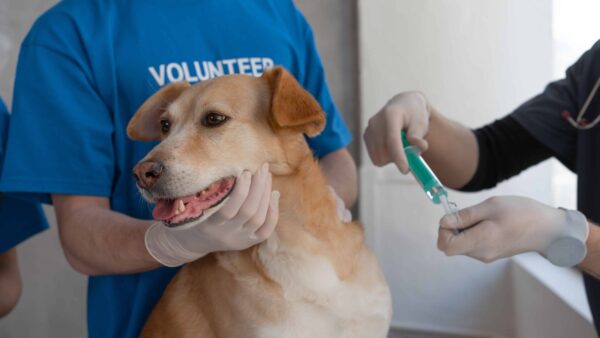Popcorn is high in fiber and low in glycemic load compared to many other snack foods, so when consumed in moderation, it is a healthy addition to a diabetic’s dog diet.
Regular air-cooked popcorn is safe for dogs in small amounts. Butter popcorn or popcorn with other toppings is not safe for your dog on a regular basis.
Popcorn for dogs is not the same as popcorn for humans, and if you’re worried that your dog might have a sugar-induced hypoglycemic reaction, you should look into the Diabetic Dog Food List.
In this blog post, we have revealed a vet-approved and well research answer to this question “Can a diabetic dog have popcorn?” We also made a list of foods your lovely diabetic dog should avoid.
Without further ado, let’s proceed!
Diabetic Dog Food List

A diabetic dog should stay away from foods high in carbohydrates. These foods are often called “carbs,” and are basically just sugar and starch.
Your canine friend should get as much protein as possible from their diets. Compared to sugar, protein will fill and bulk your canine friend, without adding any of the harmful sugar.
Diabetic dog food lists include foods rich in protein. You can also make your own diabetic dog food by adding ingredients like chicken by-products.
In addition to the ingredients in diabetic dog foods, make sure that your dog is getting the right amount of fiber. Fiber can help reduce the amount of glucose released by the body.
Fibers can also help your dog feel full longer, because they take up more space in the digestive tract. Low-glycemic-index foods also don’t spike blood sugar.
Diabetic dog foods can be prescription food or high-quality meals. Talk to your vet about which options will be best for your pooch.
When choosing diabetic dog food, make sure to consider the main nutrients your pet needs. These include calories, water, carbohydrates, fiber, and salt.
Water is essential for diabetic dogs, as their thirst and urination are increased. Fresh water should be available at all times.
A dog’s calorie intake should also be monitored. If you find that a diabetic dog food is too high in carbohydrates, you can cut back on the amount of food.
A vet will recommend a diet with high protein and fiber. Diabetic food should not spike blood glucose levels too dramatically, so it is best to stick with foods that are high in fiber and low in carbohydrates.
Your veterinarian can recommend a specific diet or a diet plan for your pooch, or you can make your own by experimenting with different recipes.
However, you should remember that finding the right diabetic dog food requires some learning.
There are many ingredients in a healthy diet. Choosing food with high fat can make your dog’s diabetes worse. Diabetic dog foods should contain probiotics and antioxidants to help balance blood sugar levels.
Diabetic dog food should also be low in calories. Make sure to buy one that contains a low-fat index so your dog will be able to digest it more easily.
Also, make sure to look for food that contains omega-3 and omega-6 fatty acids. These nutrients are crucial to canine health.
Benefits of Popcorn For Dogs
Popcorn is high in fiber and low in calories. It also contains important vitamins and minerals. Popcorn helps to maintain a healthy digestive tract, reduces the risk of diarrhea, and helps transport water through the gastrointestinal tract.
Antioxidants help to fight off free radicals in the body, which are created by environmental toxins or disease. Hence, it helps to reduce the risk of some types of cancer in dogs.
To prevent doggie dental plaque, popcorn can be coated with Aloe Vera Gel. Then, add some herbs to improve the digestive health of your dog.
Aloe Vera is an important antioxidant that enhances the immune system. It also helps to fight off bad breath. You can add one or two teaspoons of olive oil to the popcorn before serving it to your dog. But, don’t overdo it! Too much popcorn can lead to obesity.
Another advantage of popcorn for diabetic dogs is its high fiber content. A serving of air-popped popcorn contains about one gram of fiber.
Fiber helps digestion. Popcorn contains very little calories and is not a high-carbohydrate snack.
However, dogs should avoid adding any salty toppings. You can give plain popcorn to your dog instead. It tastes delicious and is good for you and your dog.
If you are unsure about whether popcorn is good for your dog, make sure to consult your veterinarian first.
When it comes to benefits of popcorn for diabetic dogs, it’s important to remember that the kernels can be toxic to dogs. Not only can they damage your dog’s teeth, but they can also choke.
However, popcorn does contain some vitamins and minerals for your dog, which is why it’s safe to feed it to your dog in moderation. It also makes a great crunching noise that makes your dog happy.
Although flavored popcorn is tempting, it’s best to avoid commercial varieties for diabetic dogs. The resulting syrup contains a high amount of sodium ion and can cause complications.
If you do give your dog popcorn, make sure it’s air-popped and avoid any kernels. It’s best to avoid flavored popcorn because it contains unknown ingredients. But if you’re still unsure, air-popped popcorn is the healthier choice for dogs.
Health Risks of Popcorn for Dogs
Many people enjoy watching movies with their dog while eating popcorn, but this common snack can be dangerous for your pet if he or she is diabetic.
The carbohydrates and fats in popcorn can cause diabetes in dogs and increase their risk for developing the disease. You can help your dog eat a healthy diet by avoiding the added sugar and salt.
But, if you’re worried about the health risks of popcorn for diabetic dogs, you need to know what to watch out for.
Firstly, make sure that you choose a healthy variety. Choose an air popped variety instead of the flavored variety, as they contain a higher amount of vitamins and minerals than conventional varieties.
Air popped popcorn contains high levels of iron, riboflavin, thiamin, and niacin. Also, plain popcorn is high in calcium and potassium.
Additionally, air popped varieties are high in zinc and phosphorus. Providing your dog with the nutrients and minerals that he or she needs is a major plus.
Although popcorn is generally safe for diabetic dogs, it is important to remember that it contains diacetyl, which is known to cause a condition called “popcorn lung.”
A single or two pieces of air popped popcorn is perfectly fine, but not more. Be sure to call your veterinarian immediately if your dog eats more than two pieces.
You can also buy plain, unsalted, air-popped popcorn to minimize the risk of your dog developing an allergy to it.
The health risks of caramel-topped popcorn for diabetic dogs are less serious than those of regular popcorn.
Caramel popcorn contains sugar, and too much sugar can result in dental problems. In addition to this, if you feed caramel-popped popcorn to your dog, you are risking a dangerous addiction.
This isn’t the only health risk of caramel popcorn for diabetic dogs – you should always make sure that your dog isn’t overly curious and never underestimate the nutritional value of plain popcorn for diabetic dogs.
While many veterinarians do not recommend feeding your dog popcorn, some do. The good news is that it is perfectly fine for your dog to eat a moderate amount of plain popcorn without salt or toppings.
However, if you’re unsure whether to give your dog popcorn, try giving him or her a handful once a month and monitor their reaction. You can then decide how much is too much for your dog.
Snacks That Diabetic Dogs Should Avoid
If you have a dog with diabetes, you know that a diabetic diet must be provided on a regular basis. But the best diet won’t help if your dog isn’t eating enough.
Your dog might be reluctant to eat, or he could have other reasons, such as a dislike for food. In either case, the diet can have detrimental effects. To get your dog to eat, try some tricks.
Use low-calorie dog food mixers to tempt him to eat. You can also add bone broth to his dry food. However, research is still needed on the best nutrient profile for diabetic dogs.
Timing insulin doses is essential for your dog’s health. However, timing food and insulin can be difficult if your dog is picky.
If your dog refuses to eat, give him a quarter dose of insulin or a half dose. But remember: never make changes to your dog’s insulin dosing without the vet’s advice.
You don’t want your dog to develop insulin resistance if they’re already underweight.
Snacks that diabetic dogs should not eat: Any foods that contain high amounts of sugar, fat, or sodium should be avoided.
A high-quality protein diet should comprise at least 18 percent of the dry matter, but should not be more than 45 percent.
High-quality protein is an essential ingredient in a diabetic dog’s diet, but you don’t want to overload them. Choose high-quality protein and make it as consistent as possible.
Some people believe that dogs can eat anything we eat, and that they don’t have any special needs. While they can’t eat everything we eat, dogs can eat certain types of vegetables.
Winter squash, for instance, can be fine for diabetic dogs. You should cook these vegetables before serving them to your pet.
But you can’t serve your dog Swiss chard. If your dog loves salad greens, you should give it to him.
Homemade dog food is not a good option for your diabetic dog. The ingredients used in homemade dog food are not always as reliable as those in commercial dog foods.
Plus, the quality of the food may vary from batch to batch. Furthermore, there’s no testing to determine the nutrient content or how quickly it will be absorbed and utilized.
As for the carbohydrate content, try to find a food that has low carbohydrates and is made of high protein.
Conclusion
Is corn for diabetic dogs a safe option? Well, while popcorn is a healthy treat for dogs, it is important to consume it moderation.
Additionally, it is important to choose the right type of popcorn for your diabetic dog. The Air-popped popcorn without salt or butter is the safest option because it has no additives which may be detrimental to dog’s health and it is high in fiber, low in calories and contains essential nutrients.
Popcorns with toppings, additives and kernels should be avoided at all costs, as they can pose threat to dog. It is also important to keep in mind that for any dietary consideration for diabetic dogs, it is best to consult a veterinarian for advice.
Before you go, you may also read: Can Dogs Eat Soursop?







Leave a comment